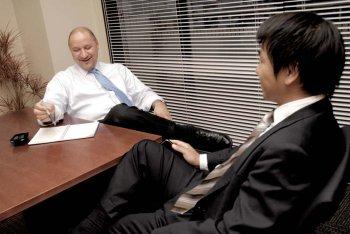High Expectations
By Darius Jones
When opportunity knocked Michael Alfant took notice, building success from scratch not once, but twice.
 Fusion Systems founder Michael Alfant.
Fusion Systems founder Michael Alfant.
When Michael Alfant looked out upon Japan’s IT industry in 1989, he saw a world of possibilities. He had been working as a junior partner in a well-known New York-based IT consulting firm, and had jumped at the opportunity to see what was available in Japan after his company was approached by Itochu Technical-Solutions Corporation (CTC). Alfant had always been interested in entrepreneurship, and knew that he didn’t belong in the mire of bureaucracy found in a large firm. But it wasn’t until he arrived in Japan that he found not only a tradition of quality and attention to detail similar to his own values, but also an underdeveloped market on the verge of expansion.
At the tail end of the ’80s, use of the Internet as we know it was still unheard of, and client server technology was just beginning to emerge as network computing moved out of the lab and into the office. Alfant had been called to Tokyo as part of CTC’s grand strategy to corner the market in client server technology. His counterpart within CTC, Ray Ribble, had scouted his company back in New York, and as the two worked within the Japanese technology giant they found a camaraderie that blossomed into a partnership. At the time, the IT industry in Japan was far less mature than what could be found across the Pacific, and Alfant soon developed the idea to start his own company doing something very few domestic firms were doing: tying together hardware and software packages.
While Ribble remained strategically placed inside Itochu, Alfant made the jump. In 1992 he began Fusion Systems, a technology solutions venture that he worked to develop and expand in his own vision. “I wanted to create a company with a real emphasis on value and teamwork, and a focus on details,” he explains, and while the American IT industry was more developed, he found Japanese values to be more in-tune to the type of character he wanted Fusion to develop.
The going wasn’t easy as a foreign entrepreneur in the early ’90s, however. “There was no access to equity or debt financing for early-stage or seed-stage entrepreneurs,” recalls Alfant, “and there was a general reticence among Japanese employees to come work for a foreign firm start-up or venture company.” And while looking for clients, the company found that there was a real reluctance among large Japanese firms to commission small businesses—especially those run by foreigners. Even so, the company found itself smartly linked to Itochu, a strategy which helped propel it to a stable place within the industry.
Fusion Systems was an IT solutions company from day one, though it began with no software and Alfant jokes that, “basically, we did anything to pay the bills.” The company started small, with only a core team of engineers Alfant had brought from the States, but Fusion was aggressive about recruiting talent. “We knew there were a lot of guys out there who aspired to better things, but in Japan in the early ’90s they were unlikely to gain the recognition they deserved, they weren’t going to get promoted, and while they were happy to be in Japan, they were looking for a place to call home,” explains Ribble. Through the pair’s networking activities, there was soon a buzz throughout the then intimate foreign community that Fusion was the place to be for the knowledgeable and ambitious. The company gradually grew with a charismatic team from across the globe.
"In a time where most multi-national firms were paying tens of thousands of dollars per month to host consulting teams from abroad, Fusion built a reputation as a company that was local, high quality, less expensive and fast."
Fusion Systems took off, thriving on smaller deals that fell out of the scope of the few existing larger agencies. In a time where most multi-national firms were paying tens of thousands of dollars per month to host consulting teams from abroad, Fusion built a reputation as a company that was local, high quality, less expensive and fast. On top of that, Fusion was flexible, working to understand its clients’ businesses and customize solutions instead of convincing them of the need for a “one-sizefi ts-all” package, as many Japanese firms were doing at the time.
Although the company grew quickly with talented staff and an expanding client base, a lack of senior managerial experience at times affected the business. Early on, Fusion developed a popular financial trading system for the Tokyo Stock Exchange called FOX (Fusion Order & eXecution), a technology solution that became its signature product. Attracted to the company’s excellent track record in software development and the fact that it was local, one major insurance company breaking into Japan contracted Fusion for a similar operation. With the FOX experience under its belt, Fusion confidently took on the project, assigning a team of business analysts, consultants and engineers without considering their previous experience in the insurance sector. After completing the equivalent of over a million dollars worth of consulting, the client was still empty handed.
What went wrong? “In hindsight, from day one we had placed the wrong team in there,” reflects Ribble. “We should have put one of the experienced teams from FOX on the project and applied the same logic. We might have possibly ended up with a product that would have been as popular as Krispy Kremes in the market today.” Instead Fusion assembled a team that, although experienced, had nothing to do with the original software development methodology and approach executed on FOX. The lessons learned in building that product had not been transferred. At one point, the CEO of the company in question approached Fusion directly, asking about a refund. “Had we done things correctly, we would have had a product that we could have sold to every other foreign insurance company in Japan. But once you screw up, everyone else becomes aware and you can’t go back and correct your mistakes, so we really mucked that one up big time.”
 Fusion prides itself on giving talented engineers a place to grow. “They’re really the stars of the company,” says Alfant.
Fusion prides itself on giving talented engineers a place to grow. “They’re really the stars of the company,” says Alfant.
But no business is without its mistakes, and after a hard lesson learned, Fusion went through a phase of reinvention when Alfant brought in an outside consultant to conduct a customer satisfaction survey, probing clients about their Fusion experience. The results were like an unwanted report card, as company after company praised Fusion as a whole, but gave them scathing criticism regarding the way the company operated. When surveyed about the project managers at Fusion Systems, one client replied, “Are there project managers? It seems like they just put a lot of talented people in our office and through sheer brute strength they got done what others can’t. But I wouldn’t call that project management.” Shocked but not discouraged, Alfant and his team used the criticism as an opportunity to act, building new project execution guidelines from the ground up and implementing a Project Management Office program within the firm.
Clients immediately saw a difference, as was reflected in the surveys the company began to conduct after every project, something they do to this day. What’s more, Fusion saw a significant increase in revenue base, a boost that made the company a lucrative prospect to overseas firms. It was during this time that, in 1999, Alfant received an offer to sell the company for $60 million. “We were in the position to realize some of the wealth we had generated, and we utilized that position,” he reasons. “To me, it’s very difficult to build a valuable asset, and when the market seems right, it’s probably a good idea to realize that value on that asset. And that was the situation we were in.”
The sales team disbanded, and while Alfant stayed aboard at first, he soon left to fill his plate with other ventures. But after six years he once again turned his eyes towards the IT consulting industry and saw the same prospects that had inspired him at the beginning of the ’90s. This time around, however, Alfant realized that the industry had changed, and that an IT firm centered only on Japan no longer fit the times. When Fusion made its second debut, it rolled out not only in Tokyo, but also Hong Kong and Shanghai.
The company has changed, reinventing itself in response to the changing atmosphere of the industry, while sticking by the clients and technologies that made it successful the first time around. Says Alfant: “What we saw in the market for technology is a dynamic where customer requirements are becoming increasingly complex, and that’s driven by cycle times, by regulatory change, by customer demands and by competitive pressure. What that really implies is much more sophisticated IT solutions.”
To handle this demand for increasingly dynamic solutions, Fusion has put together several new packages. Raptor™, an electronic exchange platform, is utilized by members of the Tokyo Stock Exchange to contact one-another. Office-In-a-Box™ is, as the name implies, a powerful IT infrastructure packaged into a single box, simple yet able to support small- and medium-sized businesses, and with guaranteed support by the Fusion team. Vector, a securities industry back-office processing solution, and an HR-based employee assessment system, are also in the works.
 Ray Ribble and Shiro Fujita, two members of Fusion’s management team.
Ray Ribble and Shiro Fujita, two members of Fusion’s management team.
Photography by Hiromi Iguchi.
Fusion is now focusing on creating systems with domain-specific applications. The company puts itself a step above others in the industry by offering clients technology solutions on a fixed-cost basis, with a flexibility that larger firms find difficult to offer.“ What we really aim to do is understand our customers’ businesses well enough that we can structure solutions they find valuable,” explains Alfant, “and in turn have them pass that value down the line to their customers too.”
Although the playing field has changed, at the core Fusion Systems is still a machine run by Alfant’s original vision of an energetic and dynamic start-up. And while the industry has grown, Alfant likens its relationship to the competition as something like an army and the Delta Force: while one is expensive, intrusive and difficult to remove, the other works stealthily with specialized tools. And while it garners little notice, it leaves a large impact.
Fusion’s tools include a talented team of engineers from various backgrounds, with skills honed by Alfant’s own management philosophy: “I think a good manager puts people in a situation in which they can excel,” he says, “and part of that is keeping them in water that’s just a little too deep, challenging them to do things by themselves and discover solutions they would have never considered.” One of those challenges— and a definite success—includes blending the multi-cultural backgrounds of Fusion’s team of 150 into an effective business culture committed to delivering value to customers of all shapes and sizes.
Fusion prides itself as a global IT solutions company, steeped in diversity and comprised of members from a variety of backgrounds and nationalities. But what they all have in common is an ambition to do whatever it takes to satisfy their customers. “We set very high standards,” says Alfant with a smile, “and if you have the best team, you win a lot of games.”






Comments
J (not verified)
December 9, 2008 - 00:43
Permalink
“I think a good manager
“I think a good manager puts people in a situation in which they can excel,” he says, “and part of that is keeping them in water that’s just a little too deep, challenging them to do things by themselves and discover solutions they would have never considered.” .... I cannot agree more. Well said.
What I want to add is that it is a thin line between drowning and a little underwater. Only a manager who has full knowledge of operation and willing to keep a little distance can tip that balance.
Anonymous (not verified)
March 18, 2009 - 22:49
Permalink
Throwing people in the deep
Throwing people in the deep end when they haven't swam before is a big mistake. Seen that happen with Fusion before